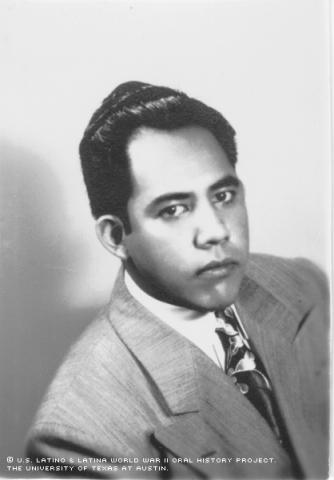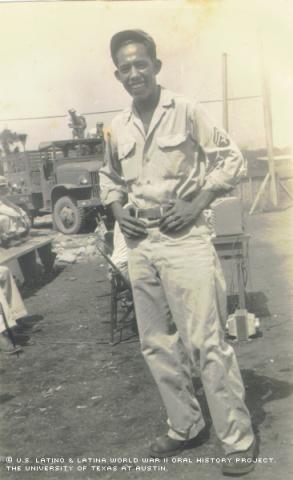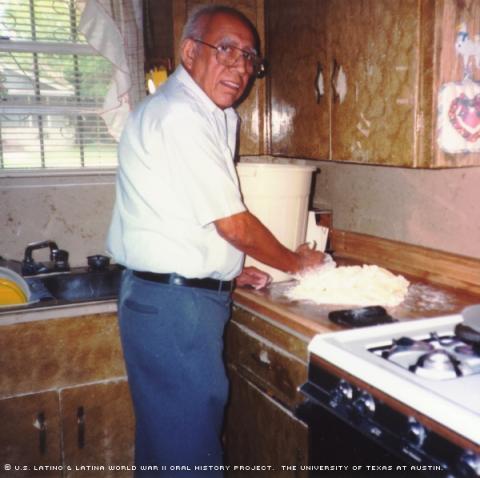


By Joanne Rao Sánchez
Eugene Casarez was just 11 years old when he started working for the Surprise Bakery on E. 7th Street in Austin, Texas.
Little did he realize that his four years of making empanadas, pan de huevo and bizcochitos would one day be tapped by the U.S. Army after he was drafted in 1944.
"They looked at my records, and said, 'We need you in the kitchen....'," Casarez said.
Speaking from his South Austin home where he has lived for the last 40 years, Casarez still has memories of his years in the Army, and the journey that took him from the streets of Austin to the jungles of the South Pacific and back home again.
One of his first opportunities to bake for the troops was on a ship from San Francisco to New Guinea. Casarez recalls that during that 17-day journey, the ship was "zigzagging on account of enemy submarines," so the bread he "helped the Navy boys to bake...would come out a little bit crooked, but it was alright. It was edible."
After being drafted in 1944, Casarez spent 13 weeks of basic training at Camp Barkley in Abilene.
Later that year, he was attached to the 35th General Hospital and joined troops in the jungles of New Guinea, as they pitched their tents. In the absence of indoor plumbing, latrines were setup. Buddies would help each other to take a shower "by throwing buckets of water over the top" of makeshift shower curtains.
For four months Casarez and the other three bakers with the hospital staff did all their cooking and baking outdoors on portable stoves. He and his fellow bakers were happy to move to Leyte, New Guinea, where they had a real kitchen.
There, they baked for the hundreds of 35th General Hospital personnel. Several months later, they were shipped to Luzon, in the Philippines, where the 35th General Hospital was set up barrack-style, with screens to keep mosquitoes out, but "only a few walls."
In Luzon, Casarez and his three fellow bakers, made pies, cakes, cookies, pastries and donuts for up to 500 patients, 200 hospital personnel and a number of other troops stationed in the area. Their shift began at 6 p.m., and they baked all night until 6 a.m., seven days a week. When they made pie or cake, they used at least a dozen large sheet pans. Each sheet pan would yield about 50 slices. That meant baking 600 to 800 pieces whenever pie or cake was on the menu.
Although he was called "Mex" by the other bakers, Casarez said it was done jokingly and with affection. He remembers always being treated well by them. He and his fellow bakers slept during the day, and in the afternoon they went to the recreation center together to play pool and drink beer.
When news reached Luzon in August 1945 that the war had ended, Casarez said, "Everybody was drinking beer; [they were] happy. It was just a big party, day in and day out. Of course, we still had to work in the kitchen and feed them." Despite the war's end, Casarez did not leave for home until Jan. 13, 1946, which was his 23rd birthday. He arrived back in Austin in February 1946.
Eugene was the first of the three Casarez brothers who went overseas during World War II to return home. The eldest brother, Frank, came back as an Army sergeant from Hawaii and Japan. And finally, in May 1946, the youngest of the three, Pete, returned from serving in the 25th Naval Construction Battalion in Guam. The spring of 1946 was a time of thanksgiving for Eugene's parents, Abraham and Eufemia Casarez. Their three sons who had served in World War II were now safely home.
Acknowledging that after World War II, "There was some discrimination, especially in the little towns [where certain businesses] wouldn't serve Mexican- Americans," Casarez said that he did not experience discrimination. On the contrary, "We were treated real well because we were in the service."
Eugene Casarez, like his brothers, Frank and Pete, returned to a job as a lens grinder. Eugene and Frank had positions waiting for them at Globe Optical Company, where they had worked before the war. Eugene has been a lens grinder for the past 60 years. At age 77, he still works part time at OSA, Ophthalmic Services of Austin. He enjoys his work, and proudly passes out his business card. "I've got a lot of satisfied people... I am still at it."
Casarez lives in South Austin with his wife of nearly 48 years, Eladia (Laya). They grew up together and both attended Our Lady of Guadalupe Catholic School, which was a few blocks from the Casarez family home on East 9th Street. The Casarez raised five children, three girls and two boys.
"All graduated from high school... are on their own ....and they all have good jobs," he notes. When speaking of his five children and five grandchildren, Casarez says with a smile, "They are all around all the time, which is good. I like it."
Unable to attend high school because he had to help support his family, Casarez's advises members of the new generation to, "Keep on in school. Finish high school... and if [you] can afford it, go to college." He enthusiastically adds, "...get active in a church, at least once a week. It did help me quite a lot in my life."
Casarez has been involved in San Jose Parish since 1953, and before that he was active in Our Lady of Guadalupe Church. He has served as an usher at San Jose for a number of years, and until recently he cooked for their jamaicas.
Casarez reminisces with pride, "[I was] cooking, as usual...Mexican dinners; arroz, arroz con frijoles, gallinas, enchiladas.... We used to make at least 500 to 600 plates ... and we would sell it all."
To get the food ready on time, he and other volunteers had to start at 2 or 3 o'clock in the morning. Cooking in the middle of the night and for such a large group might be overwhelming for some, but for Eugene Casarez it was like a familiar routine, a skill that he had learned nearly 57 years ago in the Army.

